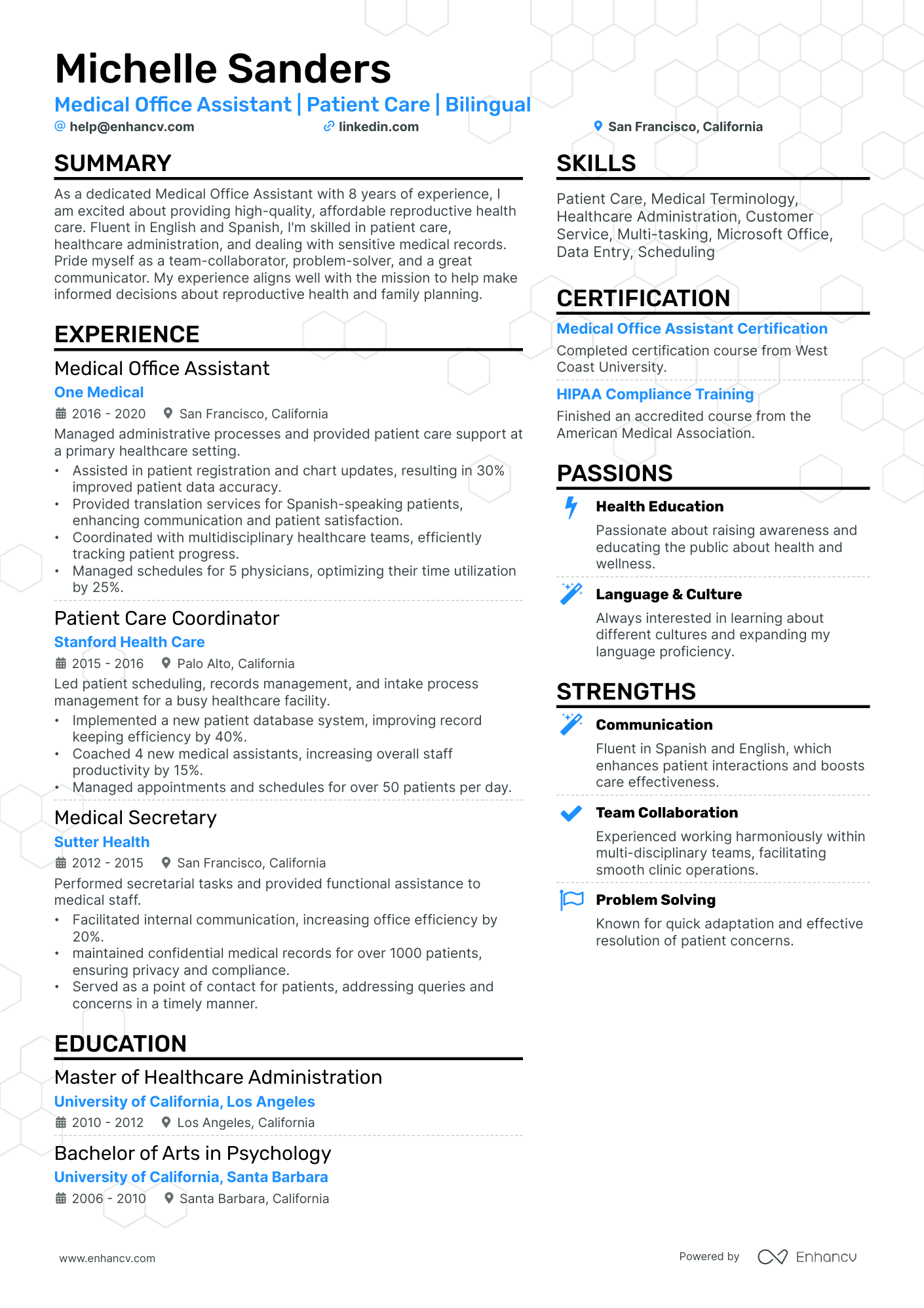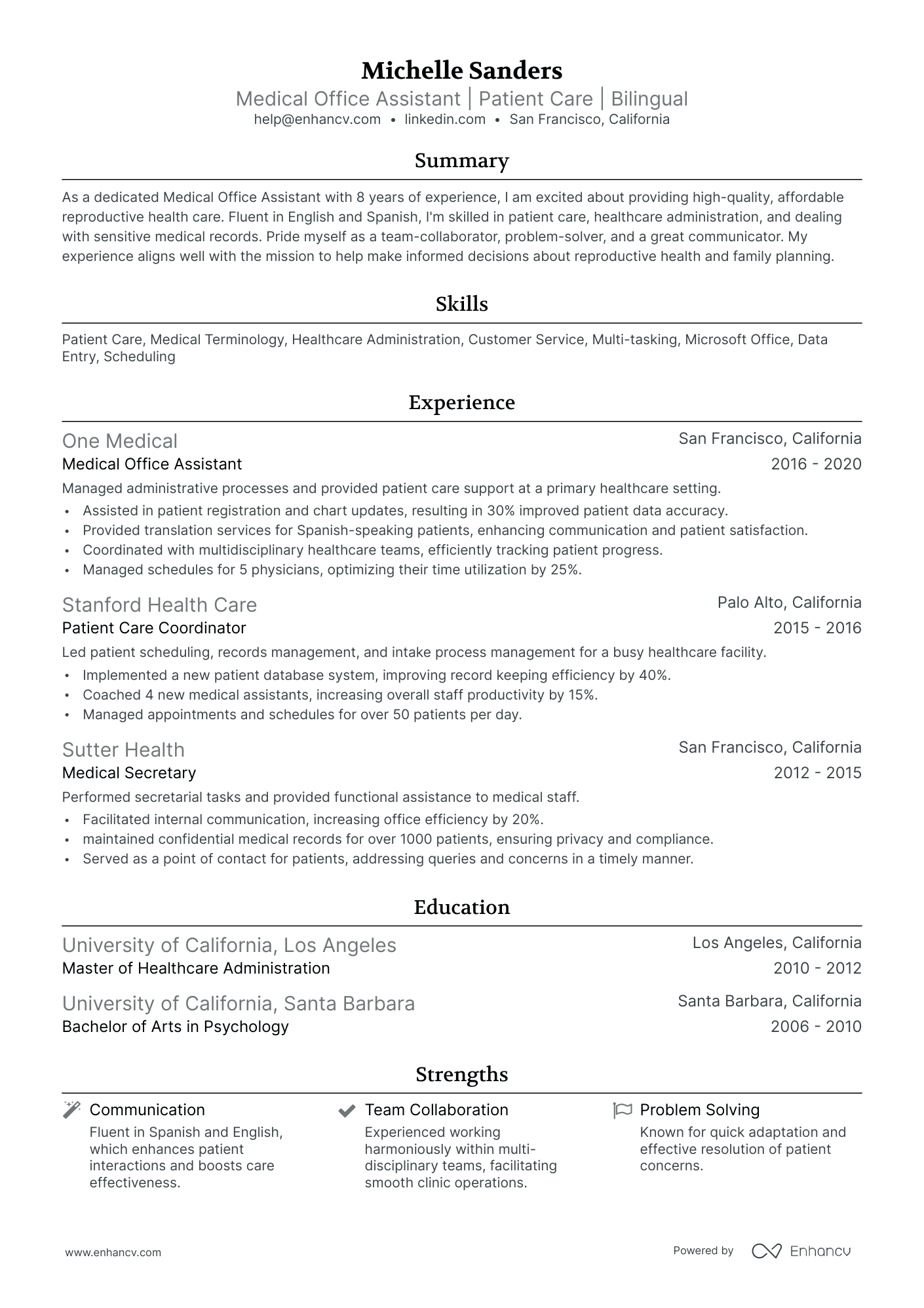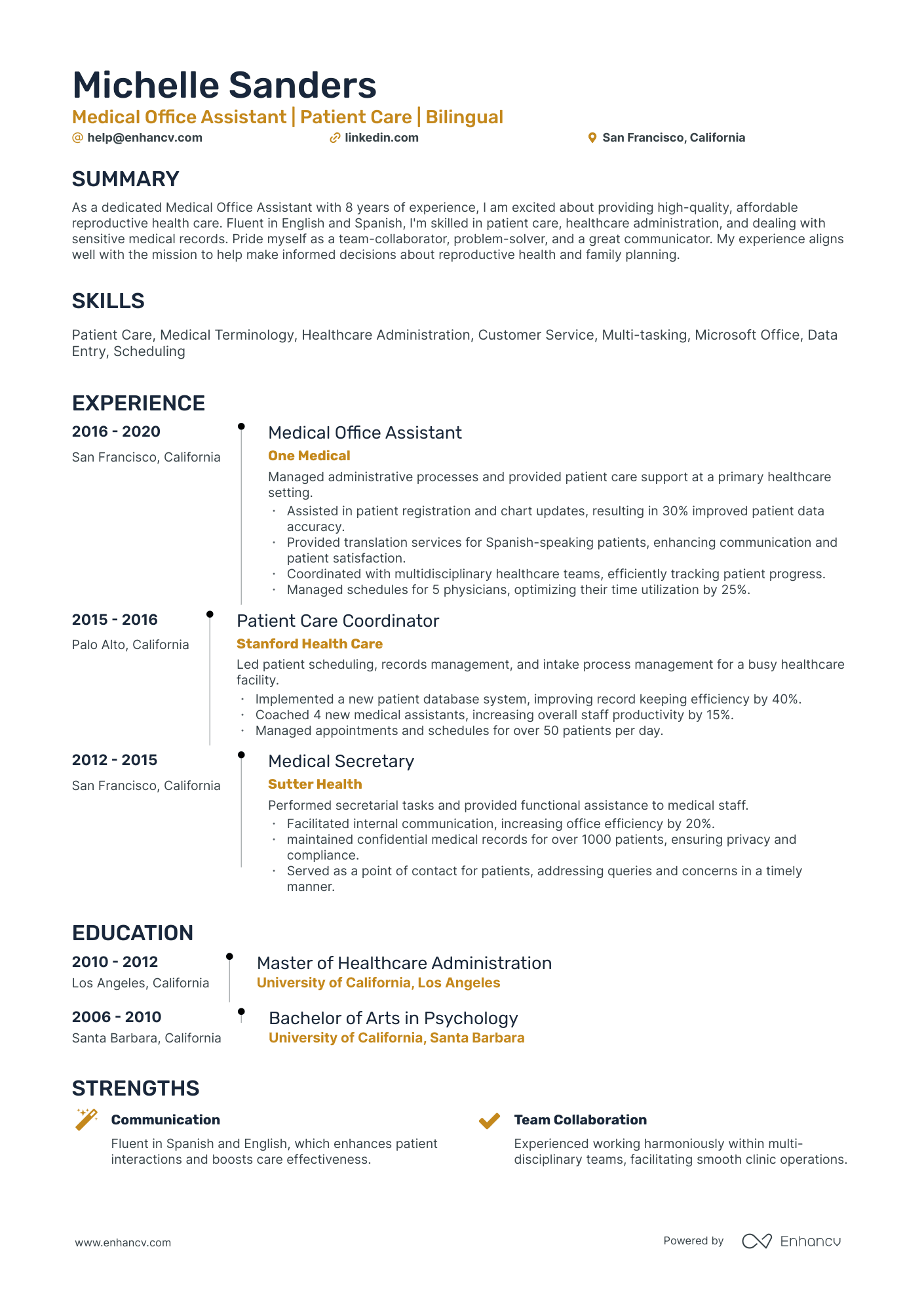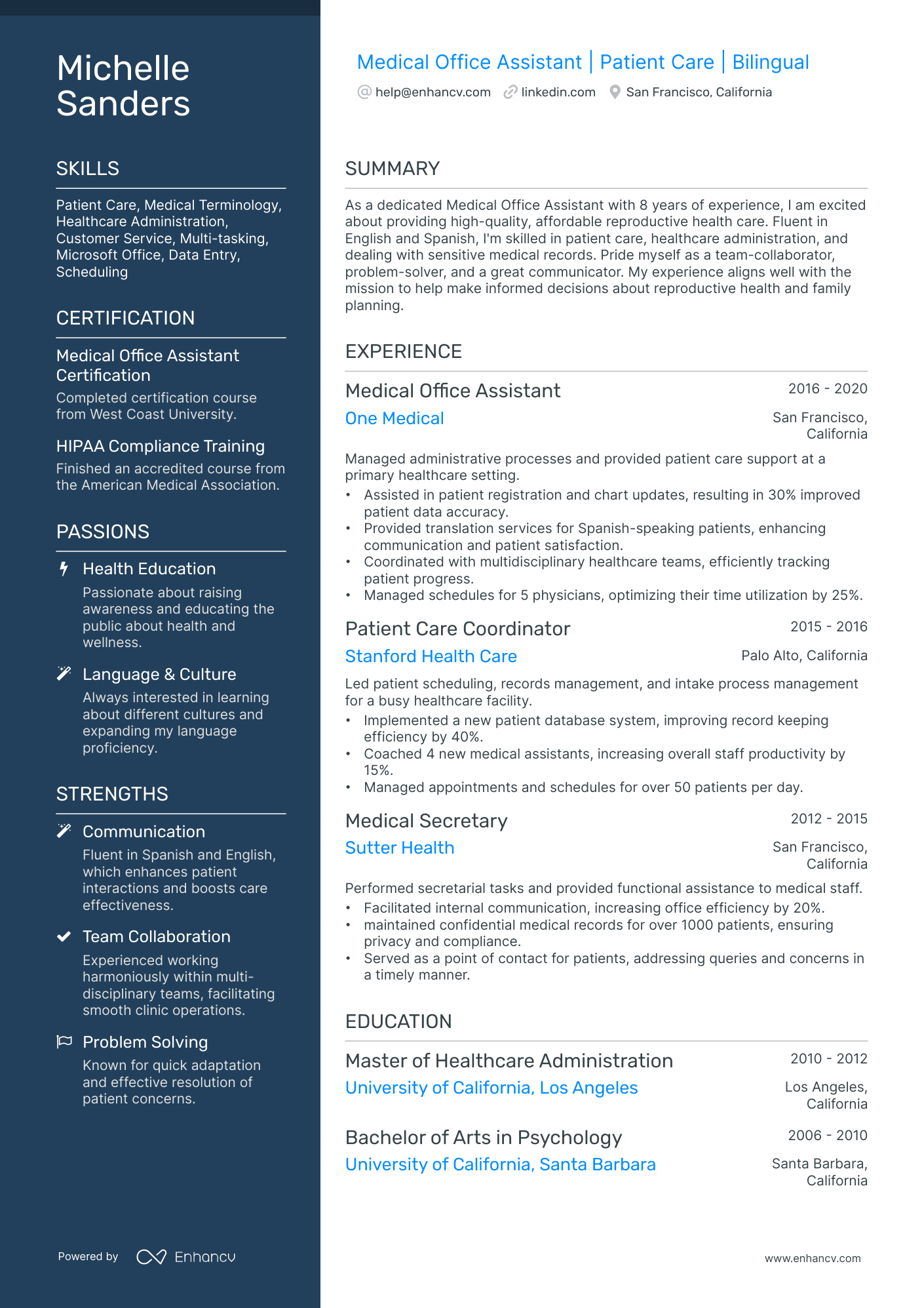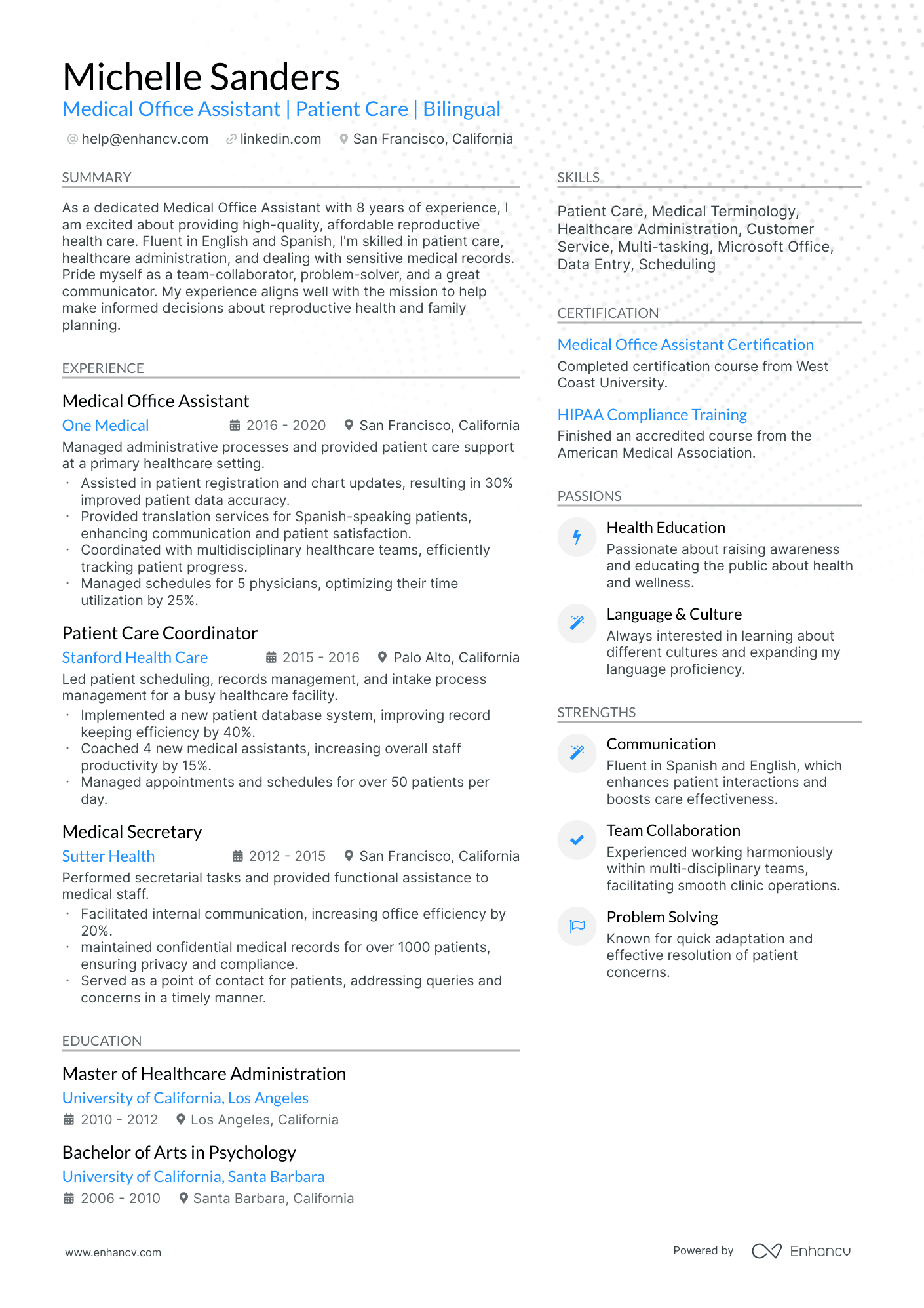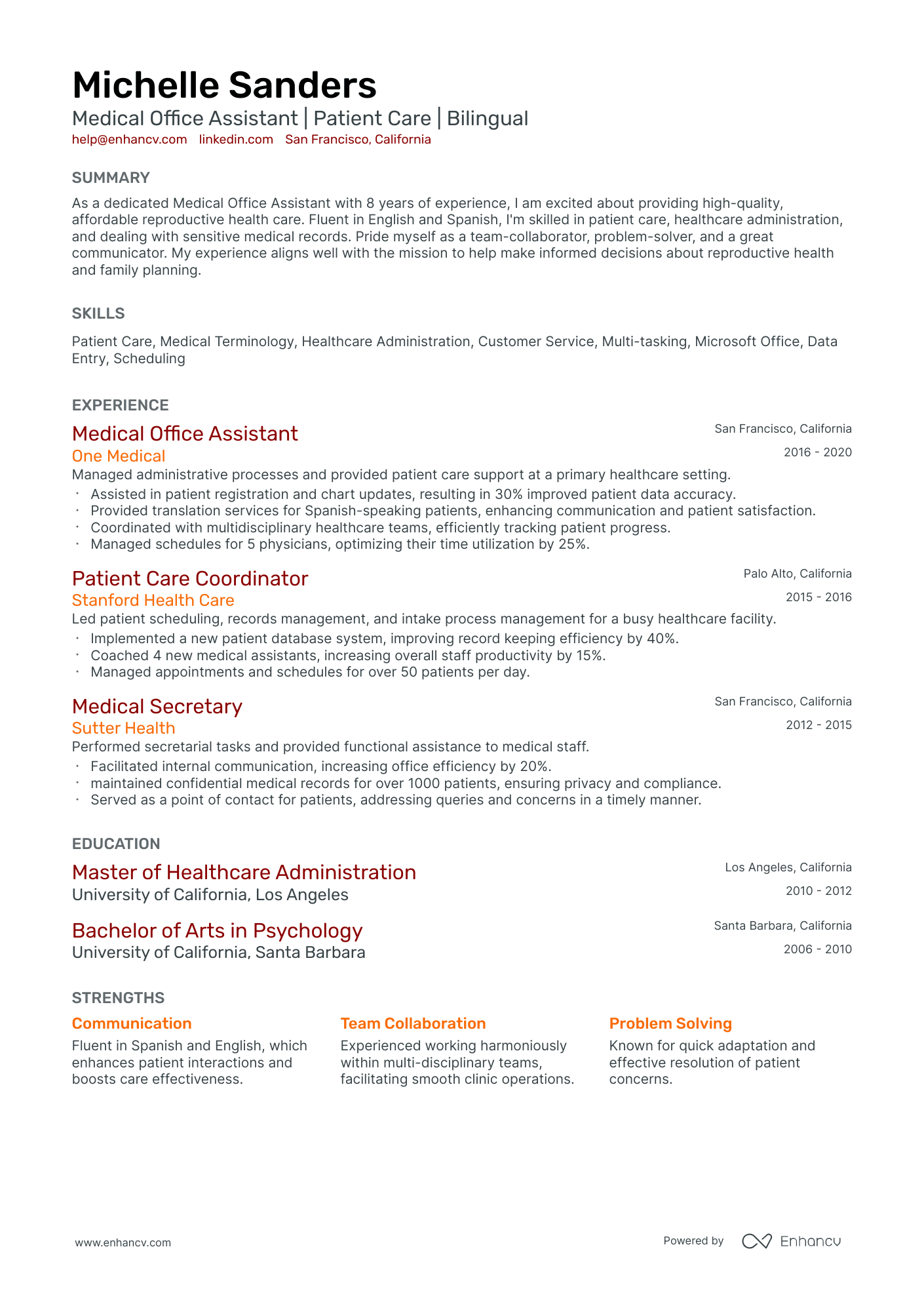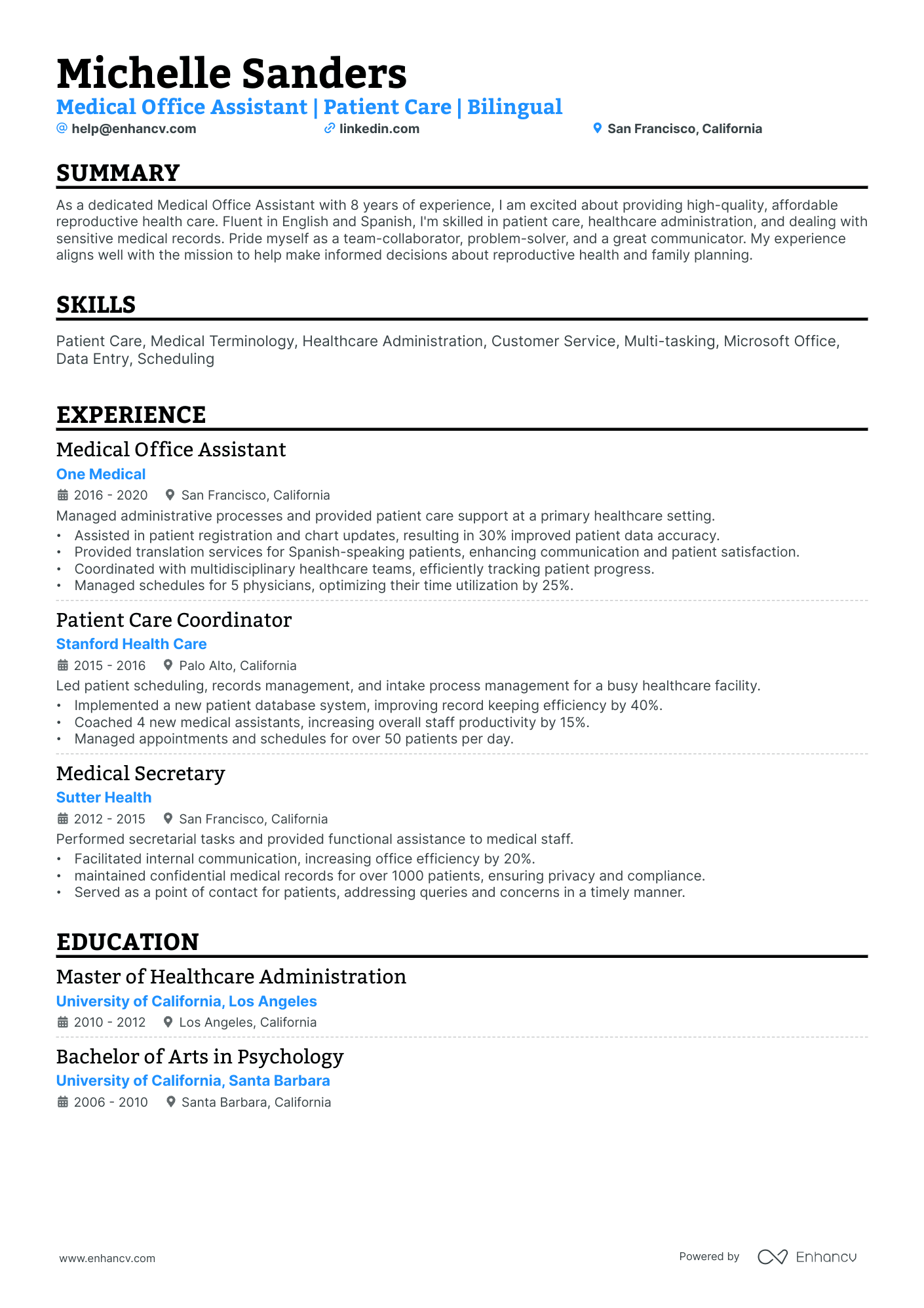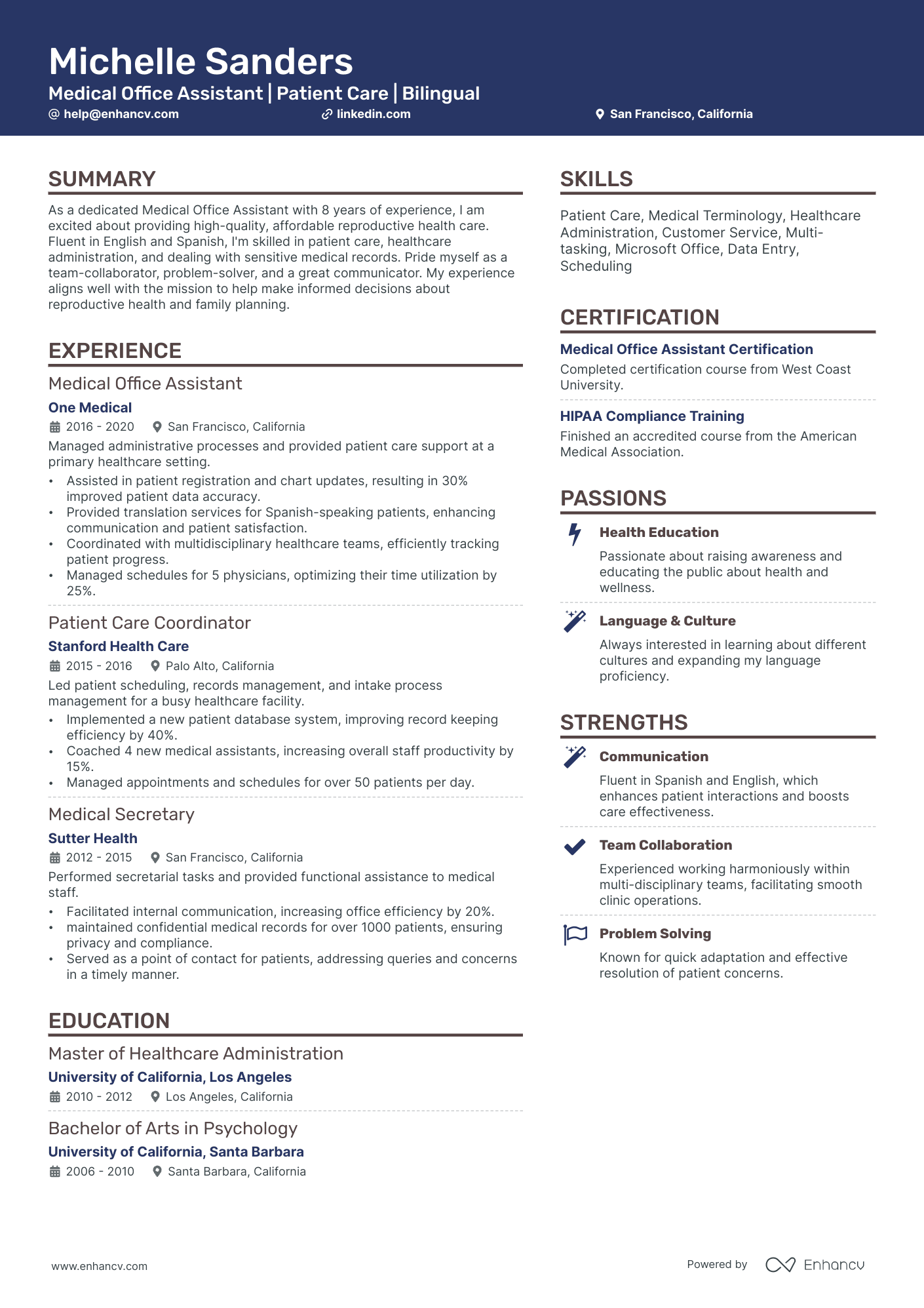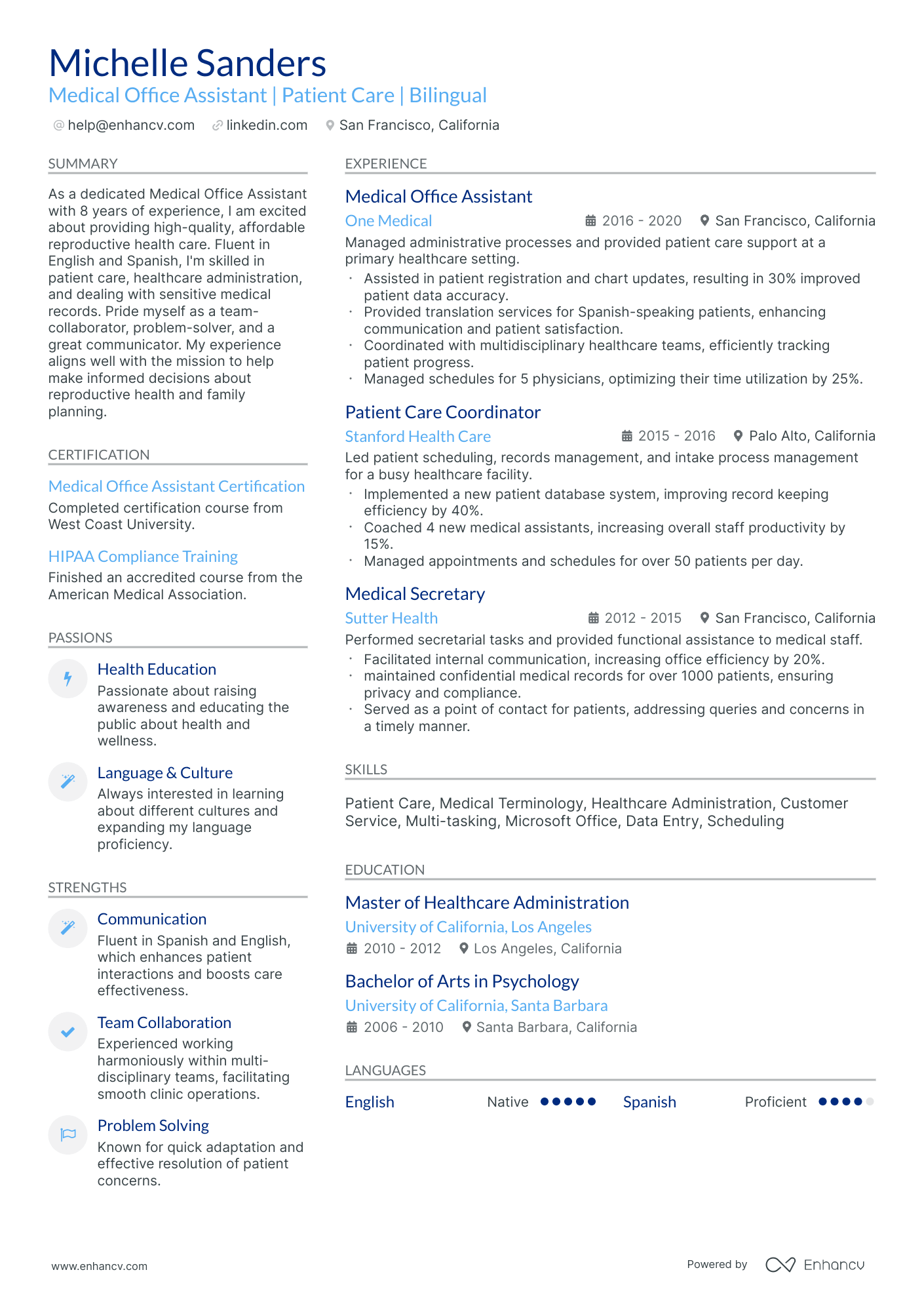Medical office assistants often struggle with adequately portraying their diverse skill sets, including patient care, administrative tasks, and medical coding, in a concise and compelling manner on their resumes. Our guide can assist by providing specific tips on how to structure your resume, incorporate relevant keywords, and effectively highlight these skills in a manner that is understandable to both medical professionals and hiring software alike.
Dive into our comprehensive guide to crafting a standout medical office assistant resume:
- Discover medical office assistant resume samples that have secured positions at top-tier companies.
- Master the aesthetics of your resume layout for maximum impact.
- Strategically present your achievements and skills across various resume sections.
- Convey to recruiters why you're the perfect fit for the job.
Recommended reads:
Deciphering the best format for your medical office assistant resume
To craft an impactful medical office assistant resume, start by thoroughly analyzing the job description.
Your chosen resume format should seamlessly align your experience with the role's requirements.
Consider these four pivotal elements:
- Present your experience effectively. If you boast a wealth of pertinent experience, employ the reverse-chronological resume format, listing roles by date, beginning with the most recent.
- Maintain brevity. Limit your resume to a maximum of two pages, focusing on your most salient attributes.
- Headers serve a purpose. A well-crafted header ensures recruiters can swiftly access your contact details and professional portfolio.
- Opt for PDF. Typically, submit your medical office assistant resume in PDF to preserve its layout. However, always adhere to specific job application guidelines.
Upload your resume
Drop your resume here or choose a file. PDF & DOCX only. Max 2MB file size.
Pro tip
While color can enhance your medical office assistant resume by emphasizing key details like headlines, job titles, and degrees, moderation is key. Stick to a primary and a secondary color to maintain professionalism and avoid a cluttered appearance.
Elevate your medical office assistant resume with these essential sections:
- Header: The go-to section for recruiters seeking your contact details, portfolio, or current role.
- Summary or objective: A snapshot of your achievements and aspirations.
- Experience: A testament to your technical and interpersonal prowess.
- Skills: A showcase of your capabilities aligned with the job requirements.
- Certifications/Education: A reflection of your commitment to staying updated in the industry.
What recruiters want to see on your resume:
- Proven experience in managing medical records and healthcare billing procedures
- Familiarity with medical terminologies, coding and office software
- Strong organizational skills and the ability to manage multiple responsibilities
- Excellent interpersonal and communication skills for patient interaction
- Certification as a medical office assistant or related field.
Recommended reads:
Designing your medical office assistant resume experience to grab recruiters' attention
For the medical office assistant position, it's crucial to show how your expertise matches what they're looking for.
Your resume experience section can be a game-changer. Ensure you:
- Feature roles most relevant to the medical office assistant job you're targeting.
- Avoid diving too deep into ancient history - unless what you did a decade ago is super relevant to the medical office assistant role.
- Structure each bullet to first describe what you did, followed by the skills you utilized, and then the impact of your efforts.
- Quantify your achievements with numbers, possibly highlighting the broader impact on the organization.
- Emphasize transferable skills - those you've gained in past roles that could be valuable in your new role. This showcases your unique professional value.
Crafting the experience section doesn't mean detailing every job you've ever had. Check out the medical office assistant resume samples below to see how top professionals present their experience.
- Managed patient scheduling, resulting in a 20% decrease in appointment wait times.
- Assisted with medical procedures, ensuring accurate documentation and maintaining patient confidentiality.
- Performed administrative tasks such as billing, insurance verification, and maintaining electronic health records.
- Collaborated with healthcare providers to coordinate patient care plans and follow-up appointments.
- Trained new staff members on office procedures and software systems.
- Supported physicians in patient examinations, collecting vital signs and updating medical histories.
- Managed incoming calls, triaging urgent cases and providing accurate information to patients.
- Coordinated referrals to specialists, ensuring timely follow-up and smooth transition of care.
- Maintained inventory of medical supplies and equipment, optimizing procurement process resulting in cost savings of 15%.
- Collaborated with insurance companies to verify coverage for patients and facilitate claims processing.
- Assisted in the development and implementation of a streamlined patient registration system, reducing check-in time by 30%.
- Managed electronic medical records, ensuring accuracy, completeness, and compliance with HIPAA regulations.
- Scheduled surgeries and coordinated pre-operative requirements, improving surgical workflow efficiency.
- Provided exceptional customer service, addressing patient inquiries and resolving issues in a timely manner.
- Participated in staff training sessions to enhance knowledge of medical procedures and office protocols.
- Greeted patients, scheduled appointments, and managed patient flow, ensuring optimal clinic operations.
- Maintained confidentiality of patient information and upheld strict data security standards.
- Assisted in organizing health education programs for the community, resulting in increased awareness of preventive care.
- Managed transcription services, accurately transcribing medical notes and reports.
- Provided administrative support to physicians, including managing correspondence and coordinating meetings.
- Performed phlebotomy and collected specimens with a high level of accuracy, ensuring proper labeling and handling.
- Updated and maintained patient records using electronic health record systems, improving data accessibility and reducing errors.
- Assisted in managing inventory of medical supplies, optimizing restocking processes and minimizing waste.
- Collaborated with medical billing department to resolve insurance claim denials, resulting in an 18% increase in successful claims.
- Trained and supervised entry-level medical office assistants on clinical and administrative tasks.
- Supported healthcare providers in patient examinations, preparing examination rooms and sterilizing equipment.
- Managed patient referrals and coordinated appointments with specialists, ensuring timely access to specialized care.
- Assisted in the implementation of a paperless documentation system, reducing paper waste by 50%.
- Responded to patient inquiries and provided accurate information about medical procedures and treatments.
- Collaborated with the IT department to troubleshoot and resolve issues related to electronic health records.
- Managed front desk operations, greeting patients, and checking their insurance eligibility, resulting in improved patient satisfaction scores.
- Assisted physicians during physical examinations, documenting patient histories and updating medication lists.
- Coordinated medical records requests from other healthcare providers, ensuring timely transfer of information.
- Contributed to the implementation of a telehealth program, facilitating remote consultations and expanding patient access.
- Trained staff members on new software systems and assisted in troubleshooting technical issues.
- Scheduled and organized diagnostic tests and procedures for patients, ensuring proper preparation and follow-up.
- Maintained confidentiality of patient data and adhered to privacy regulations, including HIPAA.
- Assisted physicians in obtaining prior authorizations from insurance companies for prescribed medications.
- Developed and implemented an efficient filing system for medical records, reducing retrieval time by 25%.
- Provided translation services for non-English-speaking patients, improving communication and understanding.
- Managed patient demographic data, ensuring accuracy and completeness of information.
- Assisted in the implementation of an electronic prescribing system, reducing prescription errors by 40%.
- Coordinated referrals to specialty clinics, advocating for patients' healthcare needs and facilitating timely appointments.
- Created and maintained a database of community resources, aiding patients in accessing support services.
- Supervised the reception area, ensuring a welcoming and efficient experience for patients and visitors.
- Conducted medication reconciliations for patients with multiple prescriptions, reducing medication errors by 15%.
- Assisted in the implementation of an electronic medical record system, improving documentation accuracy and efficiency.
- Managed patient appointment reminders via phone and email, decreasing no-show rates by 10%.
- Collaborated with billing department to resolve insurance claim discrepancies, resulting in increased revenue by 12%.
- Trained and mentored new medical office assistants, providing guidance on office procedures and customer service.
Quantifying impact on your resume
<ul>
Writing your medical office assistant experience section without any real-world experience
Professionals, lacking experience, here's how to kick-start your medical office assistant career:
- Substitute experience with relevant knowledge and skills, vital for the medical office assistant role
- Highlight any relevant certifications and education - to showcase that you have the relevant technical training for the job
- Definitely include a professional portfolio of your work so far that could include university projects or ones you've done in your free time
- Have a big focus on your transferable skills to answer what further value you'd bring about as a candidate for the medical office assistant job
- Include an objective to highlight how you see your professional growth, as part of the company
Recommended reads:
Pro tip
The wording of your experience items should be with active, power verbs, instead of adjectives. Always be specific about each item you detail, and never overuse vague buzzwords. You weren't just "organized", but rather "Enhanced internal work processes to optimize operational management by 65%".
Medical office assistant resume skills: showcasing both hard and soft skills
Your medical office assistant resume should show recruiters your range of skills. List the tools and software you use (hard skills) and how they fit into your daily tasks. But don't stop there. Share the personal traits (soft skills) you've gained from your experiences. Here's how:
- Showcase three top career achievements.
- For each achievement, mention a hard and a soft skill you used.
- Highlight unique skills that set you apart.
- Discuss how your skills improved the workplace or team culture.
Check our list for popular hard and soft skills in the industry.
Top skills for your medical office assistant resume:
Electronic Health Records (EHR) Management
Medical Billing and Coding
Appointment Scheduling Software
Patient Management Systems
Insurance Verification Tools
Microsoft Office Suite
Medical Terminology
Data Entry Software
HIPAA Compliance Knowledge
Laboratory Information Systems
Communication Skills
Attention to Detail
Time Management
Customer Service Orientation
Problem-Solving Skills
Teamwork and Collaboration
Adaptability
Empathy
Organizational Skills
Multitasking Abilities
Pro tip
If you're in the process of learning a pivotal skill for the role, mention this on your resume. It demonstrates initiative while maintaining transparency.
Highlighting your educational and certification milestones on your medical office assistant resume
While skills alignment is increasingly prioritized, your educational background and certifications still play a pivotal role in establishing credibility.
To effectively present your academic and certification achievements:
- Detail your educational journey, including the institution and duration.
- Highlight recent and relevant certifications, showcasing your commitment to continuous learning.
- Be concise; focus on the skills and knowledge gained rather than exhaustive details.
- If a certification is in progress, mention the expected completion date.
Remember, authenticity is key. If a certification is pending, be transparent about it.
Best certifications to list on your resume
```
Pro tip
If you have basic certificates, place them in the skills or experience section. This saves space for high-demand industry certificates.
Recommended reads:
Choosing between a resume summary or objective
Many medical office assistant candidates ponder whether to include a resume summary or objective.
Here's a breakdown:
- A Resume objective outlines your career aspirations. It tells recruiters why you're applying and the value you can bring.
- A Resume summary offers a snapshot of your significant achievements, giving a quick overview of your expertise.
New professionals might lean towards an objective, while seasoned experts might prefer a summary. Whichever you choose, ensure it's tailored to the role.
For inspiration, review examples from established medical office assistant professionals.
Resume summary and objective examples for a medical office assistant resume
- With over 7 years experience in the healthcare sector, I bring a proven track record as a compassionate and dedicated medical office assistant. Proficient in EHR management, medical terminology, and patient scheduling while achieving a 95% patient satisfaction score at my last tenure.
- An organized professional with a decade of experience in various administrative roles, now seeking to apply my skills in a medical office assistant position. Excellent background in data management and customer service paired with a desire to contribute to patient care.
- Medical office assistant boasting 5 successful years in a high-volume pediatric clinic. Exceptionally proficient in medical billing and coding, appointment scheduling, and maintaining patient records. Achieved an efficiency increase by overhauling the patient record management system.
- Experienced in database administration, I am eager to transition into healthcare as a medical office assistant, bringing a strong foundation in managing large amounts of data accurately and efficiently. Known for my meticulous nature and excellent interpersonal skills.
- I am a recent graduate in Health Administration with a focus on providing top-notch support in medical settings. Seeking a medical office assistant role, I aim to leverage my training in medical coding, patient registration, and record keeping to ensure smooth office operations.
- As an entry-level candidate with a certificate in Medical Office Administration, I am driven to launch my career in a health setting. My goal is to provide exceptional support to medical professionals, ensuring efficient administration processes and superior patient care.
Extra sections to boost your medical office assistant resume
Add more sections to show off your unique skills and personality.
- Projects - Include any impressive ones you've done outside of work.
- Awards - Show off any industry recognition.
- Volunteering - Share causes you care about and skills you've gained.
- Personality - Hobbies or favorite books can give a glimpse into who you are.
Key takeaways
- Format your medical office assistant resume for clarity and coherence, ensuring it aligns with the role.
- Highlight key sections (header, summary/objective, experience, skills, certifications) within your medical office assistant resume.
- Quantify achievements and align them with skills and job requirements.
- Feature both technical and personal skills across your resume for a balanced portrayal.
